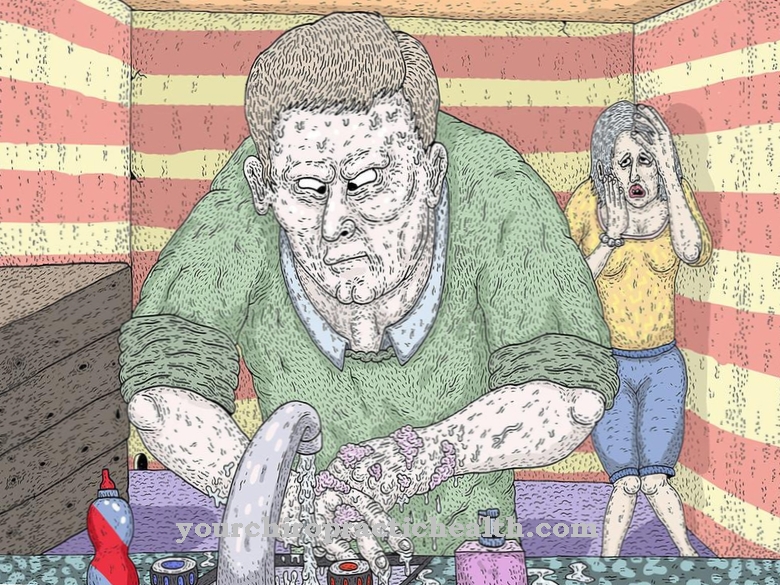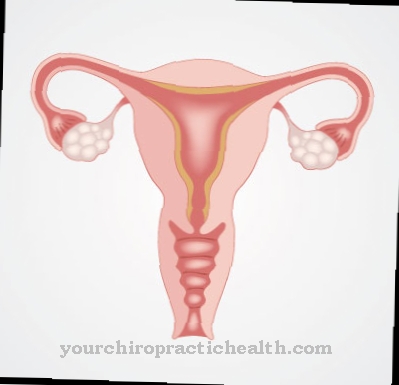Cardiac asthma is the term for the shortness of breath that one gets when the heart is no longer pumping hard enough and therefore blood is backed up in the lungs. It is therefore the symptom of left heart failure.
What is cardiac asthma?
The so-called asthma cardiale is in principle not a disease, but a symptom of an illness. It is a medical term for shortness of breath, dry cough and an audible "wheezing" when breathing out.
In contrast to the much better known bronchial asthma, the cause of cardiac asthma is found in the heart - the lungs are only the ones that suffer.
causes
Heart failure can occur for several reasons: It mostly affects older people, whose hearts simply weaken over the course of their lives. However, diseases such as metabolic or rheumatological cardiomyopathies, acute events such as (repeated) heart attacks or even myocarditis often contribute significantly to the development of heart failure and increasingly affect younger people.
Medicines can also weaken the heart muscle. Once that happens, this process cannot be reversed. The heart muscle is no longer able to "pump away" its usual flow of blood, the result is a build-up of blood in front of the heart. The backflow in front of the left ventricle can be traced back into the upstream pulmonary veins and into the pulmonary capillaries, where the gas exchange with the breath takes place.
This increased volume in the small circulation already leads to the typical symptoms of cardiac asthma, but it is not the end of the story. If the pressure in the vessel becomes too high due to the congested blood, blood plasma and, in some cases, blood cells are "pressed" into the lungs - liquid collects in the lung alveoli, which then hinders the exchange of gas. If there is enough fluid, this can be heard from a breath-synchronized "bubbling", the typical moist rattling noises of cardiac - i.e. heart-related - pulmonary edema.
In a narrower sense, the term "asthma cardiale" also refers to the narrowing of the bronchial tubes in analogy to bronchial asthma, which hinders the flow of oxygen into and, above all, the flow of oxygen into the lungs. This also happens when fluid escapes into the bronchial wall, causing it to swell. An audible "wheezing" when breathing out and a dry cough are the result.
If the blood finally backs up even further and the right ventricle is also involved, there is also a backlog in the great circulation with leg edema and other symptoms.
You can find your medication here
➔ Medication for shortness of breath and lung problemsSymptoms, ailments & signs
Cardiac asthma is a serious disease that also leads to serious complaints. In the worst case, this disease can also lead to the death of the person affected if it is not treated properly or in good time. Those affected suffer primarily from a strong cough due to cardiac asthma.
The cough mainly occurs at night and can have a negative effect on the patient's sleep. Many of those affected also suffer from insomnia or from depression and irritability. As the disease progresses, it also leads to shortness of breath and, in severe cases, to loss of consciousness.
If the internal organs are no longer supplied with oxygen, they can also be damaged. Diseased breathing noises occur, which are particularly amplified at night. Many people feel that they are suffocating, which can lead to fear of death or a panic attack. Cardiac asthma is often accompanied by frothy sputum. The entire physical endurance is also minimized by this disease. Those affected therefore also suffer from permanent fatigue and exhaustion.
Diagnosis & course
Cardiac asthma, also in analogy to bronchial asthma, often runs like attacks with shortness of breath. These seizures often occur between 2 and 4 a.m. in the middle of sleep. At this point, edema is reabsorbed from the rest of the body and washed into the pulmonary circulation with the bloodstream. This is acutely overloaded, resulting in cardiac asthma with shortness of breath and coughing fits.
Most people, when they wake up with symptoms like this in the middle of the night, automatically get up and open the window to get some fresh air. This also improves the air in most cases, which is due to the fact that the upright posture relieves the lungs and the blood volume is increasingly shifted back to the legs according to the force of gravity.
Since heart failure is a serious and serious illness, it is imperative to see a doctor. He will then have the symptoms described exactly and initiate a comprehensive diagnosis, which begins with a physical examination. Already here a lot can be found out about the performance of the heart with the eye, hand and stethoscope.
An EKG, a heart ultrasound and an X-ray of the lungs are then part of the usual follow-up examinations, at least if there is acute shortness of breath and the suspicion of pulmonary edema. Under certain circumstances, depending on the suspicion of the cause of the asthma cardiale, a cardiac catheter examination can also be carried out.
Complications
Various complications can occur with cardiac asthma. This leads to a build-up of blood in the lungs (congested lung). If the backlog is chronic, scar tissue can form in the lungs. As a result, the person concerned can no longer breathe in fully and suffers shortness of breath, which is why they have to breathe faster and deeper.
The backlog of blood can also lead to an escape of fluid into the lungs, which to a certain extent can lead to pulmonary edema. This can become inflamed and lead to pneumonia, which in the worst case can also lead to lung failure (respiratory insufficiency). The patient suffers from a lack of oxygen because he can no longer absorb enough oxygen or release carbon dioxide.
Cardiac asthma occurs due to a weak heart (heart failure). Heart failure is often associated with irregular heartbeat (arrhythmias). In the case of atrial fibrillation, for example, thrombi can form in the atrial wall due to the stasis of the blood. These can loosen and be carried away with the bloodstream.
This can lead to a pulmonary embolism with shortness of breath and chest pain or even to a stroke, which is characterized by paralysis and loss of speech. With ventricular fibrillation, if left untreated, the circulatory system can quickly come to a standstill and even immediate cardiac death.
When should you go to the doctor?
In the event of persistent shortness of breath, shortness of breath or gasping for breath, a doctor should clarify the cause. The same applies if the heart palpitations, dizziness or a general feeling of weakness occur without physical exertion or athletic overload. A doctor's visit is particularly urgent if pathological, mostly rattling breath noises are noticed or a foamy sputum occurs. If you feel suffocated, an emergency doctor must be called immediately, who can determine the cardiac asthma and, if necessary, treat it directly on site.
Immediate medical clarification is also required in the event of heart failure or another disease of the cardiovascular system, metabolism or immune system. People who are overweight, smoke or consume excessive amounts of alcohol should discuss these symptoms with their family doctor.
If there is difficulty breathing or sputum as a result of excessive exercise or a flu-like infection, a medical examination is also required. Once diagnosed, cardiac asthma symptoms can be treated well. In the case of chronic complaints, regular medical evaluation may be necessary.
Doctors & therapists in your area
Treatment & Therapy
Asthma cardiale as a symptom of heart failure can be treated quite well. In acute cases, a strong diuretic such as furosemide is usually prescribed in the hospital, which drives the water out of the body within a short time. This relieves the pulmonary circulation and leads to the resorption of the edema from the lungs - free breathing is the result.
In the long term, heart failure is treated with step therapy, which also begins with a diuretic or an ACE inhibitor; beta blockers or digitalis (cardiac glycosides) can also improve the function of the heart muscle.
Regular medical checks of the heart function and the drug level are necessary during the course.
Outlook & forecast
The course of asthma cardiale is associated with fluctuations and depends on the severity of the disease. In the event of a pronounced form of the disease, this ultimately leads to an unfavorable prognosis. The symptoms change in the course of development and depend on the activity of the heart. In severe cases, the heart fails and the patient dies. The mortality rate is currently 5-10% of all patients. Normally, the older the patient, the lower the chances of recovery.
A mild to moderate degree of cardiac asthma, on the other hand, is easily treatable. With today's medical options, there is a good chance that this form of the disease will not lead to drastic changes or restrictions in everyday life. Adjustments are necessary and overuse must be avoided. Nevertheless, participation in social and professional life is possible.
The patient can also take self-help measures, which contribute significantly to an improvement in the symptoms. Avoiding stimulants such as alcohol and nicotine increases the chances of recovery. With regular check-ups and a healthy lifestyle, the patient with cardiac asthma has a normal life expectancy. However, complete freedom from symptoms or a cure is currently not to be expected. However, deterioration in health is possible at any time.
You can find your medication here
➔ Medication for shortness of breath and lung problemsprevention
If you don't want to let it get that far in the first place, you should of course live a generally healthy life, avoid risk factors for cardiovascular diseases such as smoking or being overweight and, from the age of 35, take advantage of the health check-up paid by the health insurance company .
Here, increased blood lipid levels or developing high blood pressure can be detected in good time and treated accordingly. Furthermore, the symptoms described above should lead everyone to a doctor quickly. Adequate therapy for the early stages of heart failure can not only significantly improve the quality of life, but also reduce the otherwise massive mortality rate of this disease.
Aftercare
Follow-up care for Asthma cardiale consists of medical checks and lifestyle adjustments. Cardiac asthma is rarely actually curable, so that follow-up measures are primarily designed to minimize the risk of deterioration.
Overweight, a further weakening of the heart and high blood pressure are considered risk factors. These are the factors that need to be mitigated. This means that those affected may have to change their diet in order to find a normal weight. In addition, moderately intensive endurance sports should be practiced in order to improve the heart and breathing.
The type and extent of the sport must be discussed with the doctor so that it does not cause excessive stress. Alcohol and smoking have very negative effects. If you have left heart failure, which is the most common cause of cardiac asthma, ideally both should be stopped or reduced to a minimum.
Since the symptoms are particularly evident at night when lying down, which is also due to gravity, sleeping in an elevated position is recommended. The upper body should always be positioned above the legs so that blood congestion can sag more easily.This relieves the heart and lungs. Regular control of the heart is important. Medication may also have to be adjusted.
You can do that yourself
Cardiac asthma is the symptom of left heart failure. A weakness of the heart muscle is best prevented. Particular risk factors are obesity, type 2 diabetes, smoking and excessive alcohol consumption. Sports activities that lead to overexertion can also damage the heart muscle.
Athletes should therefore adapt their training quota to their level of fitness and consult a doctor as soon as the first signs of heart problems appear. Under no circumstances should you exercise hard during a cold or a flu-like infection. Infectious diseases that have not been cured are one of the most common causes of heart failure in young people.
Once the cardiac asthma has developed, the patients can only alleviate individual side effects on their own. The severe cough combined with shortness of breath, which occurs especially at night, is easier for many patients to bear when the upper body is slightly straightened in bed. Buying a special bed frame should be considered here.
Against the edema, which often forms not only in the lungs but also in the legs of those affected, naturopathic medicine recommends dehydrating agents such as nettle tea or baths with Epsom salt, which is intended to flush toxins and excessive fluid from the body. It is also recommended to reduce the consumption of table salt through food. Secondary plant substances from hawthorn are used to strengthen the heart muscle.

.jpg)


.jpg)



















.jpg)



